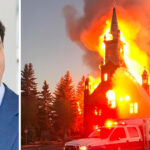Blog Post
The truth about church lockdowns
By Jonathon Van Maren
Religious leaders are struggling to determine how best to respond to unreasonable restrictions, or how to determine when restrictions are unreasonable. In conservative-leaning media, these clashes are often presented as yet another example of State hostility towards the religious. This is undeniably true in part, but the framing misses the forest for the trees.
There is a much bigger story here, beyond the justifiable anxiety about government overreach and the somewhat exaggerated claims of persecution (Chinese Christians worship at home for much different reasons). In many ways, the COVID-19 pandemic is exposing alarming and important things about our society that are getting lost in the non-stop social media roar, the torrent of distracting conspiracy theories, and mounting paranoia.
One of them, as Maclean’s recently noted, is that the pandemic “has busted the myth that Canada values its seniors.” The heartbreaking subject of how we warehouse our elderly deserves its own essay. But the major story here is the extent to which the West has become post-Christian by almost every measure.
In many ways, this is not news. A few years ago, data on the scale of secularization in Europe over the past half-century were released, revealing that a mere 18 per cent of those who identify as Christian regularly show up for worship services. In the U.S., 20 per cent to 25 per cent of U.S. adults identify as “nones”—a percentage that is higher among younger adults than older adults—and according to a recent Politico/Morning Consult poll, 49 per cent of voting-age Gen Z respondents identified as either agnostic or atheist.
These numbers provide essential context to the ongoing challenges faced by churches and other houses of worship during the COVID-19 pandemic. Those of us who have grown up in religious communities tend to forget that over the past two or three generations, our lived experiences have become increasingly unique. A minority of Westerners attend church services; most have not read the Bible; nearly all are totally unfamiliar with the terminology that comes as a natural second language to the religious.








